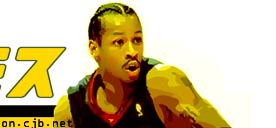





| Back home, always a hero |
|---|
| Hampton, Va., was proud of Allen Iverson long before he donned a Sixers jersey. Those close to him are happiest that the rest of the world is finally coming to appreciate his good qualities. |
|
Down here in his hometown, they call him Bubba Chuck, a sweet, sad-eyed guy whose life and legend are protected by strong Southern women who don't like what people have been saying about that gorgeous, misunderstood child. Known to anyone who doesn't really know him as Allen Iverson, Bubba Chuck (named by his mother for two uncles) is a megawatt hero in Philly and across America as he leads the 76ers into the second game of the basketball championship tomorrow night. But it wasn't too long ago that folks were putting him down, criticizing him for the cornrows and tattoos, the misbehaving entourage, and the run-ins with the law. And Southern women don't forget. "Oh, see, he can do no wrong - now," says Iverson's godmother, Debi Harper-Bridges, noting with a smirk that winning seems to wipe away all sins. "The press is saying he's a good boy - now." Iverson's latest successes - being named MVP of the NBA and climbing with his teammates into the basketball finals - are the topic of animated conversation throughout this city of 147,000, where he was a hero before he ever took a jump shot on South Broad Street. From the Straight Outta Philly hoagie shop (run by a Philadelphia woman who missed cheesesteaks) to the Coliseum Mall, people chatter about the skinny kid who took Bethel High School to state championships in basketball and football in the early 1990s. "I can't keep enough of his Sixers jerseys in stock," says Mike Modeen, manager of The Sports Fan shop, where Iverson himself buys clothing. "Sales are up 400 percent over last year. He's the man now." The local papers are full of Iverson stories, the sports-talk radio shows crackle and spark with opinions and smart-mouth remarks. On the public basketball courts, where Iverson sometimes plays in the off-season, kids such as Romanzo Watson emulate the superstar's moves. "You see kids dribbling, saying, 'I'm Chuck, I'm Chuck,' " Watson says. "Everybody wears his shoes." But among a small group of 40-to-50-year-old women who are close to Iverson and his mother, Ann, these championship playoff days are a time of quiet joy. For years, they saw Bubba Chuck's promise, wept at the setbacks, and wanted so much to tell the world that the athlete seen for years as difficult, edgy and irresponsible was just a good kid with a big heart. There is, these women say, a complexity to the man not often captured in the sports pages. You'll read about his so-called posse, including two childhood friends who were arrested on drug charges while driving Iverson's Mercedes. But, they say, you don't hear about Linwood Harper, a childhood friend who attended the prestigious Berklee School of Music in Boston and is a television producer. "There are two sides to Allen," says Pat Covas, an assistant principal at Bethel who taught Ann and was a team trainer when Iverson played there. "When he's out, when he's with his boys, he's a hip-hop man. When he's with older people, he's kind, quiet, polite, and he speaks the queen's English." For the longest time, Michael Jordan was the emblem of the NBA - a model-handsome, affable superstar who wore Italian suits and projected a safe, corporate image. Iverson - with his gangsta-style baggy clothes and heavy jewelry, his rap album with lyrics that denigrated women and homosexuals, and his seeming aloofness - was seen as a public-relations disaster for the league. The NBA went so far as to airbrush out Iverson's tattoos in a photo on the cover of Hoop, a league publication. "The NBA wanted him to wear suits," Harper-Bridges says. "They thought he was arrogant and cold to fans. But he was just overwhelmed by the money and the people." Drop $40 million on a naive 21-year-old, and you're bound to set his gyroscope out of whack, the women say. But, they add, he's maturing. And improving. You just have to accept that Iverson - who turns 26 today - is not all things to all people. "I know there are sides to him I'll never see," Harper-Bridges says. "He's sweet as sugar. But he won't be sweet when he's with his boys. And there's no way in the world I'll ever listen to his CD, with all the cussing on it. He's a good man who loves his two children. And he loves his momma more than life itself." People who know Iverson smile when they hear him talk in the media about the rough streets on which he was raised. In Hampton's Aberdeen section, where he was born, "birds are chirping and kids are playing all over the place," says Butch Harper, Debi's brother and Iverson's next-door neighbor and community-league basketball coach. Neat, one-story bungalows sit on grassy parcels along winding streets lined by old oak trees. Ann moved Iverson to the adjacent city of Newport News for a couple of years, into the Stuart Gardens Apartments housing project. Fronted by thick lawns and buffeted by ocean breezes, the well-kept complex sits in a more troubled area known for poverty and drug dealing, police say. "But it's not a tough neighborhood like the tough neighborhoods in Philadelphia," says Boo Williams, former basketball star at St. Joseph's University, now a community basketball coach for whom Iverson played eight years in Hampton. This is not to say that Iverson had an easy life. "The problem was within the family," Williams says. "That's not unusual in a single-parent home. It's not a Leave It to Beaver life." Ann gave birth to Iverson when she was 15. The father wasn't in the picture and Ann's longtime boyfriend was imprisoned for drug-related charges. The Hampton inner circle won't speak much about those times. "Ann was initially rough-cut," Harper-Bridges says. "She's more savvy now." "It was a typical public-assistance family," Harper says. "They were renting and they were migratory." Harper says Iverson acquired "street smarts" during his days in Newport News. And it was his friends from gritty "Bad News," as the city is sometimes called, and not Hampton, who became part of his permanent entourage, Harper says. Ann moved the family back to Hampton for Iverson's high school years. He did astonishing things with a basketball and became The Man at Bethel High - until Valentine's Day 1993, when Bubba Chuck decided to go bowling. His Hampton inner circle calls it The Incident. At Circle Lanes, as it was then called, two groups of kids, white and black, were bowling. Hampton is known as a successfully integrated town, a home to working- and middle-class people with jobs in the military, telecommunications and the ship-building industry. Mostly, everyone gets along. But that night, someone used the n-word and a fight broke out. When it was over, four teens - all of them black - were arrested. One of them was Iverson, age 17. At the trial, he was convicted of a little-used, Civil War-era crime known as "maiming by mob." The crime, in essence, was throwing a chair at a girl - a charge Iverson and others deny. Everyone expected he'd get probation. Instead, Judge Nelson Overton sentenced Iverson - a juvenile with no criminal record - to five years in an adult prison. Hampton was torn apart along racial lines, and those are remembered as bitter times. Harper-Bridges recalls seeing a scarecrow dressed in Iverson's basketball jersey hanging in effigy from a tree. Today, even the owner of the bowling alley thinks the court's judgment was a travesty. "The sentence was ridiculous," Curt Judson says. "We never even pressed charges." Iverson spent four months in the minimum-security Newport News City Farm. "He was very polite and nice and didn't have a minute's trouble," remembers former farm director Billy Payne. Then-Gov. L. Douglas Wilder released Iverson on conditional clemency, a kind of pardon. In 1995, an appeals court overturned Iverson's conviction - not saying Iverson was innocent, but rather asserting that he was wrongly charged with acting as part of a mob. "When the governor let him out, he was our [Nelson] Mandela," Harper says. "He was every hero shackled, then released." Afterward, Iverson was involved in minor incidents, including a 1997 arrest in which he was accused of possessing marijuana and a .45-caliber gun in a car outside Richmond, Va. The Hampton inner circle says it has seen lots of personal growth since then. "Having children matured him," says Harper-Bridges. In July, Iverson plans to marry Tawanna Turner, his longtime fiancee, with whom he has two children - daughter Tiaura, 6, and son Allen 2d, 4. The women could do without Iverson's tattoos, though. "I was there the day he got his first tattoo, a Georgetown [University] bulldog [mascot]," Covas says. "If I'd known he'd get 20 more, I wouldn't have made the fuss I did." After the championship series, Iverson will return here, to his home in nearby York County. He'll still show up at the Aberdeen Elementary School courts, and still beckon to any youngster who wants to play him one-on-one. "I don't know any other NBA guys who do that, unless they're getting paid," Boo Williams says. He'll hang out at the mall, at some clubs - your typical regular-guy superstar eating sausage sandwiches at Mickey D's. But first, there's work to do. "He'll beat L.A.," Harper predicts. "Bubba Chuck was born with heart. He'd walk up to a lion, call him a name, and punch him in the face. "Shaq who? Kobe what? Bubba Chuck, that's my Negro. I'm full of Allen Iverson." |

|
|---|
| Author |
| Alfred Lubrano |
| Source |
| Inquirer |
| Return to Articles |